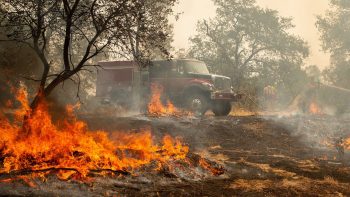As wildfires spread, the contractors are called in
The U.S. Forest Service is breaking records — but they’re not the ones they like to brag about. The agency spent $243 million the last week in August dealing with more than 75 wildfires in the West. Agriculture Secretary Tom Vilsack said he expected the service will spend $200 million more in coming weeks as the fire season deepens. Some of that money goes to firefighters on the front line, but a lot of it goes to contractors.
“With the current fire situation in the West, we’ve stretched the capacity, so we rely on the private contractors to fill in that gap between what we have and what we need,” said Scott Vail, an incident commander in California.
Fighting these fires isn’t like fighting a fire in the city. A lot of times it’s in the middle of a forest, so fire services have to bring in contractors to help set up tent villages, build remote showers and do the laundry.
“I mean, we have to feed people, we have to provide their communications, so all of this stuff has to come in from somewhere else,” Vail said.
But most of the time it’s not just bathrooms and catering. Daryl Stockdale has been involved with firefighting for about 40 years in Northern California. He’s the guy who manages the helicopters that come in to help — essentially air traffic control. He stopped working for the state and retired a few years ago because his cardiologist told him to, but he says business opportunity brought him back. He just kept watching what was happening: Hotter temperatures. Drought. More people moving closer to the forests.
“So I ask myself, ‘Is that going to make for smaller fires?'” he said. “No. And are the wildland agencies contributing a tremendous amount of money in the fuels management program to eliminate the risk? No. It looks like Daryl shouldn’t worry too much about technology coming up that’s going to eliminate fire anytime in the near future.”
Could a contractor work every day of the week? Maybe for a little while, but it’s not always fire season.
“Fires are pretty sporadic,” said Kevin Cushman, who owns Firestormers Incorporated. “We took off this year, end of June we got going and then we sat for three weeks with nothing happening. And then these fires took off again, and then everybody got busy. So that’s kind of part of the game. You have your real busy times and your real slow times as part of that.”
Firestormers owns two firetrucks, each manned by a three-person crew. Cushman said contractors can find themselves in an awkward spot. Their business and livelihood depend on natural disasters.
“Yeah, you don’t want to root for fires and wish for those, but when they are out there you do hope you get called out, and recoup some of that cost that we put out every year,” he said.
Forest Service firefighters have guaranteed wages, but they might not be as high as a contractor’s. Kyle Dickman fought fires for the government for about five years at $12 an hour. Now he writes about fires and has a book out, “On the Burning Edge.”
“I know that there’s a lot of people in the Forest Service, and especially the federal government, that are not too happy with all the contract crews, because the contract crews increase the cost of the firefighting,” he said.
But Dickman said the federal government doesn’t have the budget to hire more firefighters. It’s decided to spend the money on contract crews when they’re needed, even if they’re more expensive.
“I think it’s broken,” he said. “The system isn’t working. Our approach to wildland fires is flawed. And I think the people carrying out these policies are some of the best people in the world with great intentions. And they really care about solving the problems. Even if they’re walking down a road they maybe know that they shouldn’t be on.”
There’s a lot happening in the world. Through it all, Marketplace is here for you.
You rely on Marketplace to break down the world’s events and tell you how it affects you in a fact-based, approachable way. We rely on your financial support to keep making that possible.
Your donation today powers the independent journalism that you rely on. For just $5/month, you can help sustain Marketplace so we can keep reporting on the things that matter to you.


















